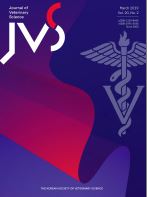Dewormer drug fenbendazole has antiviral effects on BoHV-1 productive infection in cell cultures
- 대한수의학회
- Journal of Veterinary Science
- 제21권 제5호
-
2020.091 - 10 (10 pages)
-
DOI : 10.4142/jvs.2020.21.e72
- 이용수 10

초록
Background: Fenbendazole, a dewormer drug, is used widely in the clinical treatment of parasite infections in animals. Recent studies have shown that fenbendazole has substantial effects on tumor growth, immune responses, and inflammatory responses, suggesting that fenbendazole is a pluripotent drug. Nevertheless, the antiviral effects have not been reported. Fenbendazole can disrupt microtubules, which are essential for multiple viruses infections, suggesting that fenbendazole might have antiviral effects. Objectives: This study examined whether fenbendazole could inhibit bovine herpesvirus 1 (BoHV-1) productive infection in cell cultures. Methods: The effects of fenbendazole on viral production, transcription of the immediate early (IE) genes, viron-associated protein expression, and the cellular signaling PLC-γ1/Akt pathway were assessed using distinct methods. Results: Fenbendazole could inhibit BoHV-1 productive infections significantly in MDBK cells in a dose-dependent manner. A time-of-addition assay indicated that fenbendazole affected both the early and late stages in the virus replication cycles. The transcription of IE genes, including BoHV-1 infected cell protein 0 (bICP0), bICP4, and bICP22, as well as the synthesis of viron-associated proteins, were disrupted differentially by the fenbendazole treatment. The treatment did not affect the cellular signaling pathway of PLC-γ1/Akt, a known cascade playing important roles in virus infection. Conclusions: Overall, fenbendazole has antiviral effects on BoHV-1 replication.
목차
INTRODUCTION
MATERIALS AND METHODS
RESULTS
DISCUSSION
REFERENCES
참고문헌 (0)
등록된 참고문헌 정보가 없습니다.
해당 권호 수록 논문 (13)
- Development of a biosensor from aptamers for detection of the porcine reproductive and respiratory syndrome virus
- Isolation and molecular characterizations of canine distemper virus from a naturally infected Korean dog using Vero cells expressing dog signaling lymphocyte activation molecule
- Development of a novel reverse transcription PCR and its application to field sample testing for feline calicivirus prevalence in healthy stray cats in Korea
- Comparison of dental radiography and computed tomography: measurement of dentoalveolar structures in healthy, small-sized dogs and cats
- Intra-articular replacement of a ruptured cranial cruciate ligament using the Mini-TightRope in the dog: a preliminary study
- Dewormer drug fenbendazole has antiviral effects on BoHV-1 productive infection in cell cultures
- Pharmacokinetics of thalidomide in dogs: can feeding affect it? A preliminary study
- The changes of immune-related molecules within the ileal mucosa of piglets infected with porcine circovirus type 2
- Demographics of dogs and cats with oral tumors presenting to teaching hospitals: 1996-2017
- Effects of quadriceps angle on patellofemoral contact pressure
- Antiviral effects of Bovine antimicrobial peptide against TGEV in vivo and in vitro
- Improved immune responses and safety of foot-and-mouth disease vaccine containing immunostimulating components in pigs
- Analysis of virulence traits of Staphylococcus aureus isolated from bovine mastitis in semi-intensive and family dairy farms
추천 논문
-
박승용 한국축산식품학회 Food Science of Animal Resources Korean Journal for Food Science of Animal Resources 제17권 제3호 1997.12
-
강승훈, 민병혁, 최홍열 한국미생물·생명공학회 Microbiology and Biotechnology Letters Vol.45 No.2 2017.01
-
김희숙, 조은정, 류병호 한국식품영양과학회 Journal of the Korean Society of Food Science and Nutrition Vol.28 No.4 1999.01
-
Ileok Jung, Moon-Ho Park, Ji-Soo Kim 대한평형의학회 Research in Vestibular Science 23(3) 2024.09
-
Nghi, Do Huu, Ullrich 한국응용생명화학회 Applied Biological Chemistry Vol.58No.3 2015.01